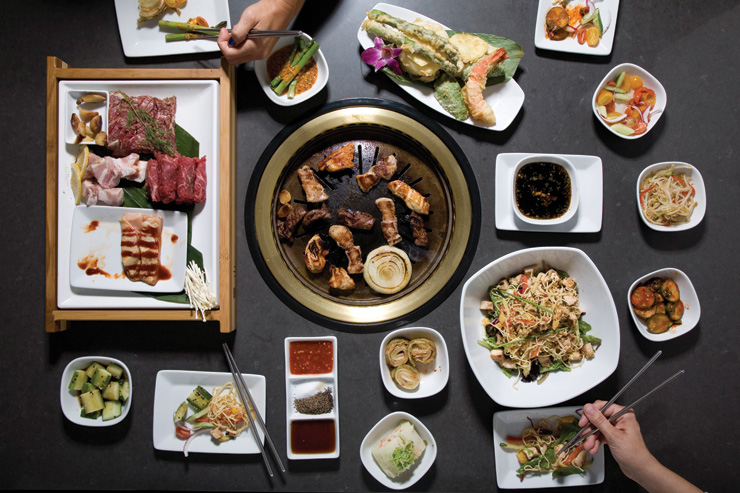By Michelle Woo Photo by Lucas Zarebinski
Gyenari Korean BBQ & Lounge
9540 Culver Blvd., Culver City
(310) 838-3131
www.gyenari.com
Check average: lunch, $15; dinner, $40
The standard Korean barbecue experience is many things, but pretty, it ain’t.
There’s the obnoxious clamor of diners drunk off soju, the overworked ajumas who snap every time you press the service button, and, of course, the clouds of grease-infused smoke that seep into your pores and leave you reeking for days.
Oh, the things one must endure for a belly full of juicy, tastebud-tantalizing slabs of grilled meat.
Until now.
Enter Gyenari Korean BBQ & Lounge, a sleek new culinary fixture in yuppie hotbed Culver City, Calif. A contemporary space decked with rustic brick walls, a massive mural of blossoming flowers and a tranquil water sculpture, the two-month-old eatery (pronounced jin-AR-ee) puts a decidedly upscale twist on classic Korean fare. Banchan just went posh.
William Shin, who co-owns the restaurant with his partners Danny Kim and chef Robert Benson, hopes the concept will help introduce Korean flavors to new audiences. “Korean food is the last in Asian cuisine to be brought to the mainstream,” says Shin, 35, an electronics importer by day. “We wanted people to get the authentic taste of Korean barbecue, but didn’t want to scare them off. You won’t see kimchi jigae on the menu.”
You will see familiar recipes tweaked for the American palate. Jeon Jeon is pajeon (Korean pancakes) prepared with your choice of applewood bacon and white cheddar cheese or shrimp, calamari and kimchi. Sunset Soup is mandu guk (dumpling soup) infused with spinach, mushrooms and rice ovalettes. The Bright Bloom is patbingsu (shaved ice), a massive dessert piled with seasonal fresh fruit and tangy mango ice cream.
The lounge menu offers even more innovative creations: Seoul Tacos (crispy wontons filled with shrimp, spicy aioli and crème fraiche), Soju Baby Backs (ribs in a spicy soju barbecue sauce), Malibu Tofu (pan-seared tofu in a soy citrus sauce, topped with fresh avocado) and an array of original Asian-inspired cocktails. For the still-apprehensive, the restaurant also offers trusty, not-quite-Korean options: a ground chuck burger, prime rib dip, and salmon Caesar salad.
Shin says Asian Americans, which make up about 20 percent of the clientele, are embracing the Korean hybrid dishes rather than scoffing at their lack of authenticity. “We feel like we’re pioneers,” Shin says. “The only complaints we’ve had are from, like, that one Caucasian customer who’s had yukgaejang at some hole-in-the-wall in K-town and feels like he’s a Korean food connoisseur.”
Fortunately for Asians and non-Asians alike, at Gyenari, named after a flower that blooms once a year, what’s most true to Korean form is the meat. On mid-table grills, guests can cook flavorful, high-quality galbi, bulgogi, beef tongue, aged pork belly, filet mignon or chicken. The best part? Special technology that sucks the smoke into underground vents (the dining area is built one foot above ground-level) and expels it outdoors. Meaning you’ll leave smelling like a gyenari. Or however you smelled when you first walked in.










